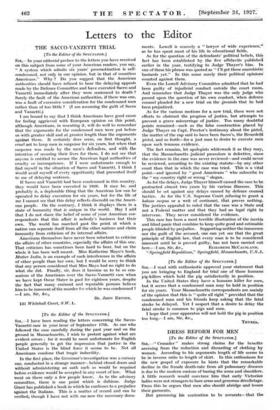Letters to the Editor
THE SACCO-VANZETTI TRIAL [To the Editor of the SPECTATOR.] SIR,—In your editorial preface to the letters you have received on this subject from some of your American readers, you say, " A system which admits six years'_ procrastination is self- condemned, not only in our opinion, but in that of countless Americans." Why ? Do you suggest that the American authorities should have refused to hear the delaying appeals Made by the Defence Committee and have executed Sacco and Vanzetti immediately after they were sentenced to death ? Surely the fault of the American authorities, if there was one, was a fault of excessive consideration for the condemned men rather than of too little? (I am assuming the guilt of Sacco and Vanzetti.) I am bound to say that I think Americans have good cause for feeling aggrieved with European opinion on this point, although Americans, in resenting it, will do well to remember that the arguments for the condemned men were put before us with greater skill and at greater length than the arguments against them. It certainly does seem, on first thought, a cruel act to keep men in suspense for six years, but when that suspense was made by the men's defenders, and with the intention of securing their lives for them, I do not see that anyone is entitled to accuse the American legal authorities of cruelty or incompetence. If I were unfortunate enough to find myself in the situation of Sacco and Vanzetti, I think I Would avail myself of every opportunity that 'presented itself to me of delaying sentence.
If Sacco and Vanzetti had been condemned in this country, they would have been executed in 1920. It may be, and probably is, a deplorable thing that the American law can be operated to delay execution for six years, but for the life of me I cannot see that this delay reflects discredit on the Ameri- can people. On the contrary, I think it displays them in a state of humanity that is unique in 'the world. May I add that I do not share the belief of some of your American cor- respondents that this affair is nobody's business but their own. The world has marched past the point at which a nation can separate itself from all the other nations and claim immunity from criticism of its internal affairs. Americans themselves have never been reluctant to criticize the affairs of other countries, especially the affairs of this one. That criticism has sometime§ been hard to bear, but on the whole it has been well meant. Miss Katherine Mayo's book, Mother India, is an example of such interference in the affairs of other people than her own, but I would be sorry to think that any person considered that Miss Mayo had no right to do what she did. Finally, sir, does it become us to be so cen- sorious of the Americans over the Sacco-Vanzetti case when we have kept Oscar Slater in gaol for eighteen years, despite the fact that many eminent and reputable persons believe him to be innocent of the murder for which he was condemned ? —I am, Sir, &c.,
ST. JOHN ERVINE.
181 Whitehall Court, S.W.1.










































 Previous page
Previous page